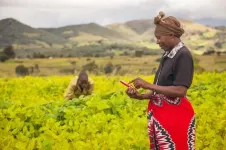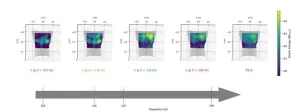(Press-News.org) A CABI-led study has revealed that there is evidence of the benefits of chatgroups to human health which can also be replicated in plant health.
The research analysed the opportunities and pitfalls of using chatgroups for plant health systems and examined the conditions for strengthening chatroom functions. It also considered the possibility of replicating reported successes in healthcare settings to plant health systems.
The scientists from CABI, who were joined by colleagues including from the Knowledge, Technology and Innovation group at Wageningen University and the University of Lusaka, Zambia, focused their attention on chatgroup usage under the Plantwise programme in Ghana, Kenya, Uganda, and Sri Lanka.
Benefits can be replicated in plant health
Dr Dannie Romney, an author of the research – which was published in CABI One Health journal – and who is Senior Global Director, Development Communication and Extension, said, “Our findings show that there is evidence of the benefits of chatgroups to human health which can be replicated in plant health.
“Replication should however not be a ‘copy and paste’ approach. This is due to the general lack of evidence-based guidelines and lessons learned to move beyond the initial adoption success of communication applications.
“Also, in practice, Plantwise plant doctor chatgroups are generally much larger than groups in healthcare settings and it remains to be seen whether increasing chatroom activity could benefit specific plant health objectives; or whether it would lead to increased labour costs, and/or diminish the participation of plant doctors.”
The aim of the CABI-led PlantwisePlus programme, which is building on the successes and learning of Plantwise and Action on Invasives programmes, which have already helped millions of farmers in over 30 countries diagnose and treat pest threats and reduce crop losses by strengthening national plant health systems.
PlantwisePlus bridges the gap where at the national and regional level there is no consistent or coordinated mechanism for detection of and response to pest outbreaks, or for providing the technical support needed to identify plant health problems and deliver effective solutions.
It draws upon a range of existing CABI open access products and projects. These include the CABI BioProtection Portal – a free tool to enhance the awareness and uptake of biocontrol and biopesticide products by growers and advisors – and the Plantwise Knowledge Bank and factsheet app.
Posting behaviour was seen to vary amongst plant health professionals
The researchers found that, in general, posting behaviour was seen to vary amongst health professionals and similar variations in participation were also observed with plant clinic networks. Higher levels of active participation were reported amongst younger members (20-39 years-old) and those with less than 10 years professional experience.
Between 2017 and 2019, for example, the proportions of participants remaining relatively silent in the plant clinic chatgroups were 37-48% in Kenya, 50-52% in Ghana, and 35-58% in Uganda. In Sri Lanka, participation was more variable across years and groups – though it rarely fell below contributions from 30% of participants in any particular year – although this didn’t mean that the remaining participants were not following exchanges.
In Ghana, during a series of plant doctor trainings in 2019, participation increased with only 22% of chatgroup participants being silent members. Furthermore, surveys conducted in Ghana show that differences in participation in plant clinic chatgroups in the country were attributable to the topics being discussed.
Hierarchy was also a factor with junior members more reluctant to post in groups that also included senior staff.
Chatgroups often revolved around several central figures
Co-author of the study, Anna Wood, who is also an Integrated Crop Management Advisor at CABI, said, “Another observation from all the plant clinic chatgroups is that interactions within chatgroups often revolved around several central figures; either diagnostic experts, experienced extension agents or chatgroup facilitators.
“We also find that smaller chatgroups in Africa were noted to encourage greater participation, with plant doctors stating that small chatgroups helped shy members to connect and reach out to others. In Uganda, Ghana and Kenya, smaller plant clinic online groups, that usually represent a particular geography (district, province etc.) or training cohort, operate alongside a national group.”
Manju Thakur, co-author and Knowledge Bank Coordinator at CABI, added that In Sri Lanka, there are only nine provincial groups and no national groups. All these groups are official, but observations were made that smaller groups were more homogenous in terms of members, less formal with more social exchanges and focused on logistics.
Larger, national groups were more heterogenous
In contrast the larger, national groups were more heterogenous, allowing access to broader expertise, but more formal and focused on knowledge exchange including addressing queries.
“This agrees with insights from healthcare settings with Pahwa et al 2018 showing that small groups encourage greater interaction; and Zhang et al 2013 who showed that large chatgroups may be less efficient with active participation declining as the group size increases.”
The researchers argue that, over time, in the plant health chatgroups, it was observed that although the number of requests for diagnostic support decreased over time, the quality of diagnostic support improved.
In addition, it was also reported that the proportion of cases where conflicting or incorrect diagnoses were given also declined. As in healthcare settings, the sharing of images across plant doctor chatgroups is critical in identifying and diagnosing pests and diseases, they said.
Increased cohesion amongst plant health network members
Dr Romney said, “Emerging evidence from the four countries involved in the plant clinic network shows that the benefits observed in human health chatgroups are also emerging in plant health. The simplification and improvement of interactions across vertical chains of communication resulted in increased cohesion amongst plant health network members.
“Additionally, the sharing of uncommon symptoms in plant clinic chatgroups was also observed to contribute to early detection and rapid response systems by raising awareness of potential outbreaks and rapidly sharing information on the correct identification of pests and diseases and on how to manage the problem.
“Most notably chatgroups improved the ease of communication in sharing information with plant doctors and in linking plant health experts in urban settings with those in rural isolated areas – resulting in improved and timely diagnosis.”
Additional information
Full paper reference
Sarunas Jomantas, Anna Wood, Nyamwaya Munthali, Willis Ochilo, Manju Thakur, Dannie Romney and Mariam Kadzamira, ‘Looking at human healthcare to improve agricultural service delivery: The case of online chatgroups,’ CABI One Health (2024) 3:1, DOI: 10.1079/cabionehealth.2024.0008
The paper can be read open access here.
END
CABI-led study shows benefits of chatgroups to human health can be replicated in plant health
A CABI-led study has revealed that there is evidence of the benefits of chatgroups to human health which can also be replicated in plant health.
2024-03-19
ELSE PRESS RELEASES FROM THIS DATE:
Spectroscopy and theory shed light on excitons in semiconductors
2024-03-19
From solar panels on our roofs to the new OLED TV screens, many everyday electronic devices simply wouldn’t work without the interaction between light and the materials that make up semiconductors. A new category of semiconductors is based on organic molecules, which largely consist of carbon, such as buckminsterfullerene. The way organic semiconductors work is largely determined by their behaviour in the first few moments after light excites electrons, forming “excitons” in the material. Researchers from the Universities of Göttingen, Graz, ...
Assessing the impact of malaria interventions through routine sampling of pregnant women
2024-03-19
Genetic diversity of the malaria parasite in pregnant women and children declined in an area targeted for malaria elimination in Mozambique, according to a study led by the Barcelona Institute for Global Health (ISGlobal), a centre supported by “la Caixa” Foundation and the Manhiça Health Research Centre (CISM). The findings, published in Nature Communications, highlight the added value of routine sampling of pregnant women as a cost-effective strategy to enhance genomic surveillance of the parasite and detect changes in transmission within the community.
Genomic surveillance of the malaria parasite P. falciparum is essential ...
Drug candidate may ‘unmask’ latent HIV-infected cells, mark them for destruction
2024-03-19
PITTSBURGH, March 19, 2024 – University of Pittsburgh School of Medicine scientists have identified drug candidates that show promise to reverse the ability of HIV to escape detection by the immune system.
The discovery, described today in Cell Chemical Biology, reveals a potential path to eliminate the viral reservoir that cannot be cleared with existing antiretroviral drugs. This reservoir is what prevents people from being completely cured of HIV even when their viral load is undetectable in standard tests.
“We ...
Epidemic of fatal prion disease kuru likely led to migration of women in the Eastern Highlands of Papua New Guinea
2024-03-19
In the most comprehensive genetic study of the people living in the Eastern Highlands of Papua New Guinea to date, researchers from Papua New Guinea and the U.K. revealed the complex population structure and migration patterns of the communities in the region. The results, published March 19 in The American Journal of Human Genetics, lay the foundation for future research on the fatal disease kuru—a disease transmitted during traditional anthropophagic mortuary practices— that devastated the area in the 20th century.
“We navigated one of the most complex landscapes possible in terms of geographical, cultural and linguistic diversity and set the scene ...
Biomarkers of the middle-aged brain predict cognitive health in old age
2024-03-19
The middle-aged brain could provide a window into future cognitive health, researchers write in a review publishing March 19 in the journal Trends in Neurosciences. The team reviewed evidence from human and animal studies suggesting that middle age—commonly considered as the period between 40 and 60 or 65 years of age—marks a shift in brain aging. They argue that more research should be dedicated to middle age, a period of life that is historically understudied.
“Middle age is associated with specific and modifiable risk factors for future dementia risk,” write the authors, who include neuroscientist Yvonne Nolan ...
USPSTF statement on primary care interventions to prevent child maltreatment
2024-03-19
Bottom Line: The U.S. Preventive Services Task Force (USPSTF) concludes that the current evidence is insufficient to assess the balance of benefits and harms of primary care interventions to prevent child maltreatment. Child maltreatment, which includes child abuse and neglect, can have profound effects on health, development, survival, and well-being throughout childhood and adulthood. The prevalence of child maltreatment in the U.S. is uncertain and likely underestimated. In 2021, an estimated 600,000 children were identified by Child Protective Services as experiencing abuse ...
Stroke risk after COVID-19 bivalent vaccination among US older adults
2024-03-19
About The Study: Among 11,000 Medicare beneficiaries age 65 or older who experienced stroke after receiving either brand of the COVID-19 bivalent vaccine, there was no evidence of a significantly elevated risk for stroke during the days immediately after vaccination.
Authors: Yun Lu, Ph.D., of the Food and Drug Administration in Silver Spring, Maryland, is the corresponding author.
To access the embargoed study: Visit our For The Media website at this link https://media.jamanetwork.com/
(doi:10.1001/jama.2024.1059)
Editor’s ...
New ultrasound technology may revolutionize respiratory disease diagnoses
2024-03-19
WASHINGTON, March 19, 2024 – The thorax, the part of the body between the neck and abdomen, provides medical professionals with a valuable window into a patient’s respiratory health. By evaluating sound vibrations produced by the airflow induced within the lungs and bronchial tree during normal breathing as well as those produced by the larynx during vocalizations, doctors can identify potential disease-related abnormalities within the respiratory system.
But, among other shortcomings, common respiratory assessments can be subjective and are only as good as the quality ...
Decision aid helps patients make informed decisions about sterilization
2024-03-19
Researchers at the University of Pittsburgh have developed a simple, web-based decision aid called My Decision/Mi Decisión that helps empower pregnant individuals who are considering tubal sterilization to make informed decisions about their reproductive health, according to a new study published today in JAMA Network Open.
With significant misunderstandings surrounding sterilization, the Pitt researchers can now offer comprehensive, engaging and accessible information to help support individuals as they make the best contraceptive decisions for themselves.
“When patients are making decisions about their health and fertility, we want to make certain ...
New spatial profiling approach maps out discoveries for future brain research
2024-03-19
An estimated one in six people suffer from a brain disorder worldwide, according to the American Brain Foundation. Current research has provided some insight into cell-communication inside the brain, but there are still a lot of unknowns surrounding how this crucial organ functions. What if there was a comprehensive map that took into consideration not just the biology of the brain, but the specific location where the biology occurs?
Researchers in the College of Engineering have developed a powerful, cost-effective method to do just that.
Chang Lu, the Fred W. Bull Professor of Chemical Engineering, has been leading ...
LAST 30 PRESS RELEASES:
Scientists show how to predict world’s deadly scorpion hotspots
ASU researchers to lead AAAS panel on water insecurity in the United States
ASU professor Anne Stone to present at AAAS Conference in Phoenix on ancient origins of modern disease
Proposals for exploring viruses and skin as the next experimental quantum frontiers share US$30,000 science award
ASU researchers showcase scalable tech solutions for older adults living alone with cognitive decline at AAAS 2026
Scientists identify smooth regional trends in fruit fly survival strategies
Antipathy toward snakes? Your parents likely talked you into that at an early age
Sylvester Cancer Tip Sheet for Feb. 2026
Online exposure to medical misinformation concentrated among older adults
Telehealth improves access to genetic services for adult survivors of childhood cancers
Outdated mortality benchmarks risk missing early signs of famine and delay recognizing mass starvation
Newly discovered bacterium converts carbon dioxide into chemicals using electricity
Flipping and reversing mini-proteins could improve disease treatment
Scientists reveal major hidden source of atmospheric nitrogen pollution in fragile lake basin
Biochar emerges as a powerful tool for soil carbon neutrality and climate mitigation
Tiny cell messengers show big promise for safer protein and gene delivery
AMS releases statement regarding the decision to rescind EPA’s 2009 Endangerment Finding
Parents’ alcohol and drug use influences their children’s consumption, research shows
Modular assembly of chiral nitrogen-bridged rings achieved by palladium-catalyzed diastereoselective and enantioselective cascade cyclization reactions
Promoting civic engagement
AMS Science Preview: Hurricane slowdown, school snow days
Deforestation in the Amazon raises the surface temperature by 3 °C during the dry season
Model more accurately maps the impact of frost on corn crops
How did humans develop sharp vision? Lab-grown retinas show likely answer
Sour grapes? Taste, experience of sour foods depends on individual consumer
At AAAS, professor Krystal Tsosie argues the future of science must be Indigenous-led
From the lab to the living room: Decoding Parkinson’s patients movements in the real world
Research advances in porous materials, as highlighted in the 2025 Nobel Prize in Chemistry
Sally C. Morton, executive vice president of ASU Knowledge Enterprise, presents a bold and practical framework for moving research from discovery to real-world impact
Biochemical parameters in patients with diabetic nephropathy versus individuals with diabetes alone, non-diabetic nephropathy, and healthy controls
[Press-News.org] CABI-led study shows benefits of chatgroups to human health can be replicated in plant healthA CABI-led study has revealed that there is evidence of the benefits of chatgroups to human health which can also be replicated in plant health.






